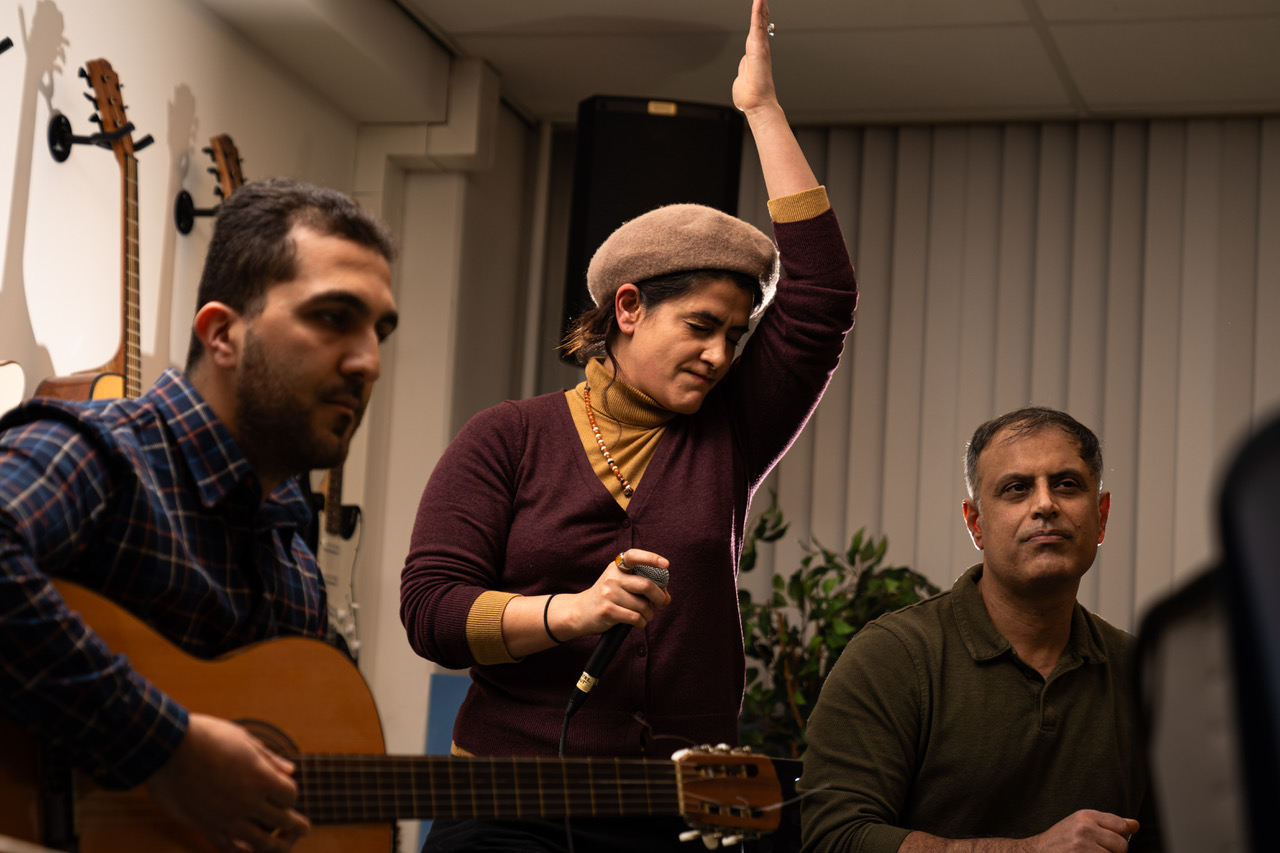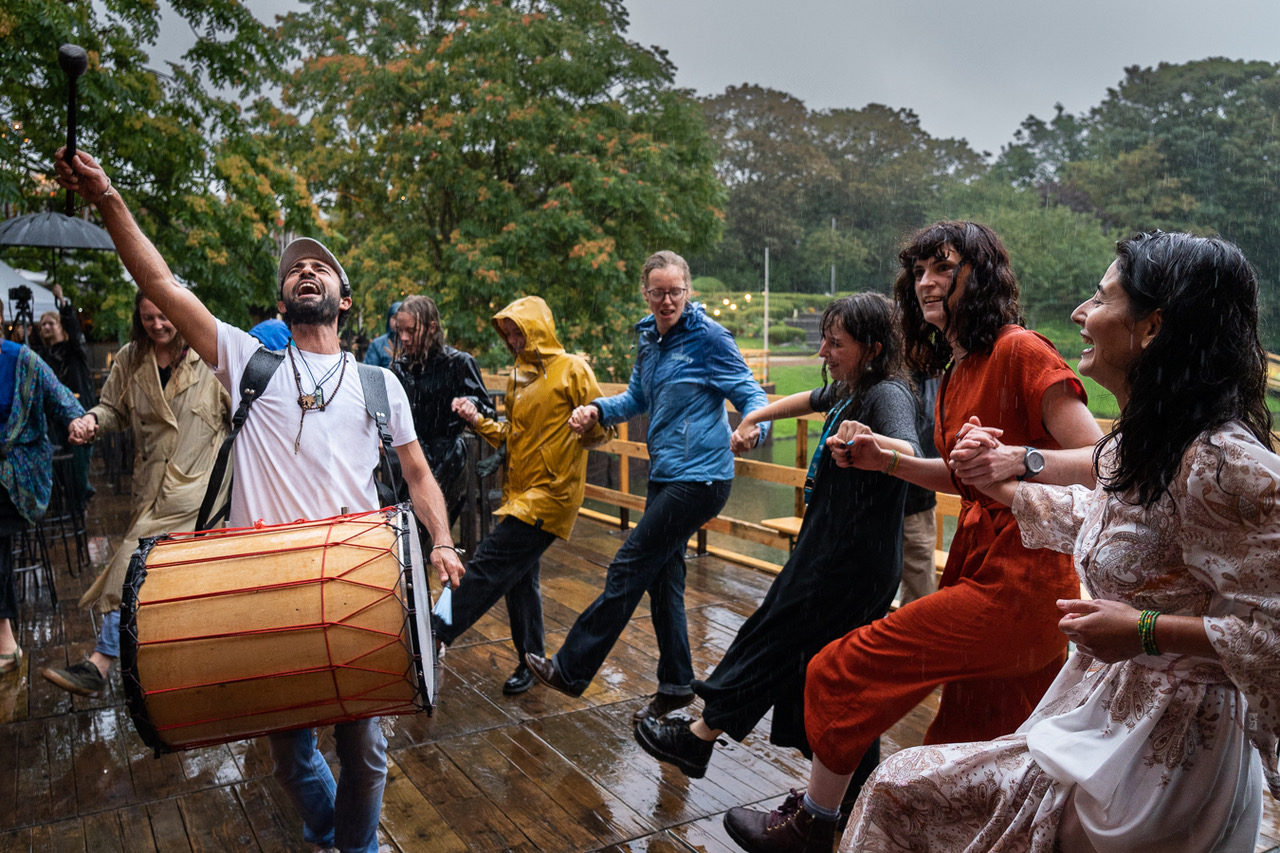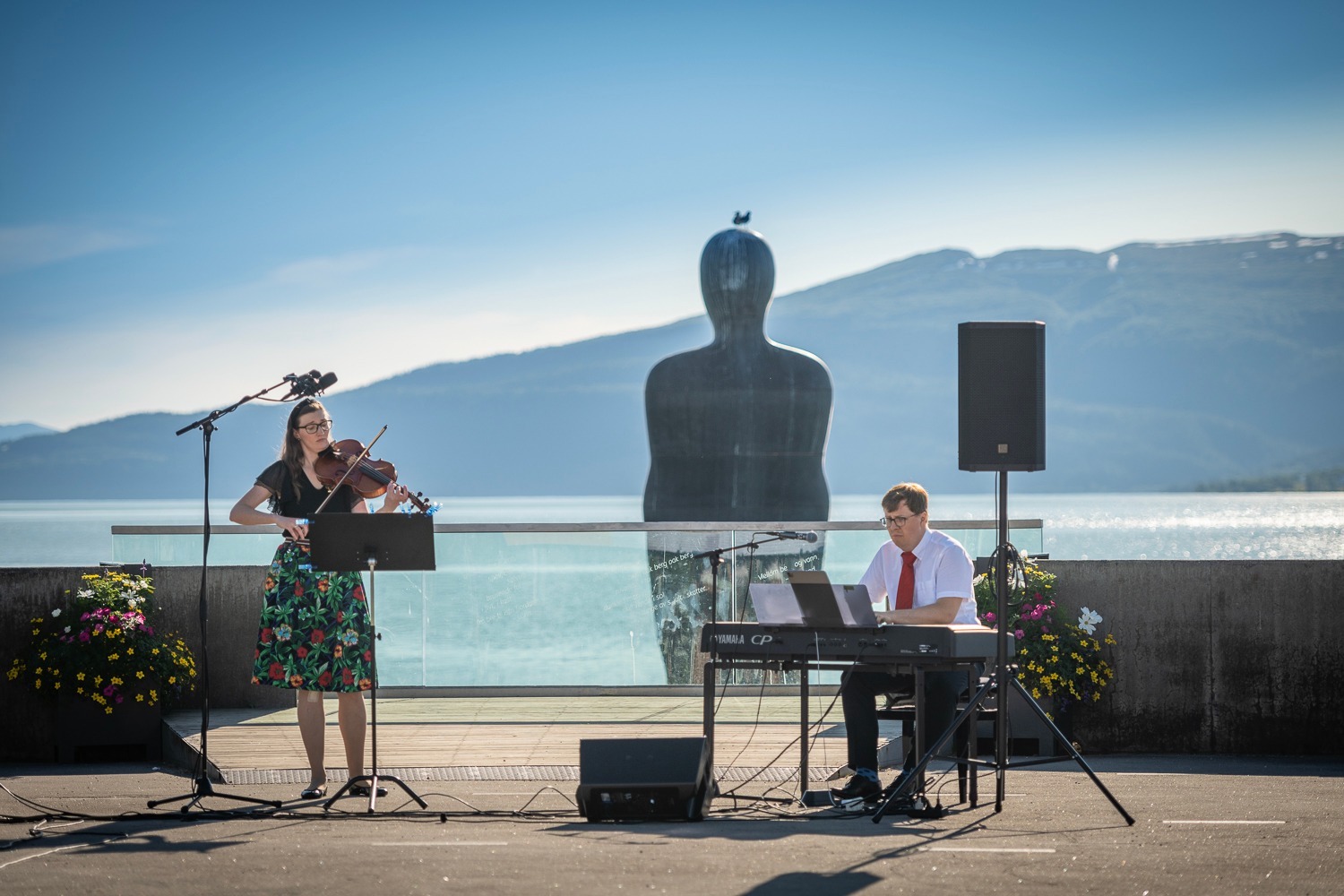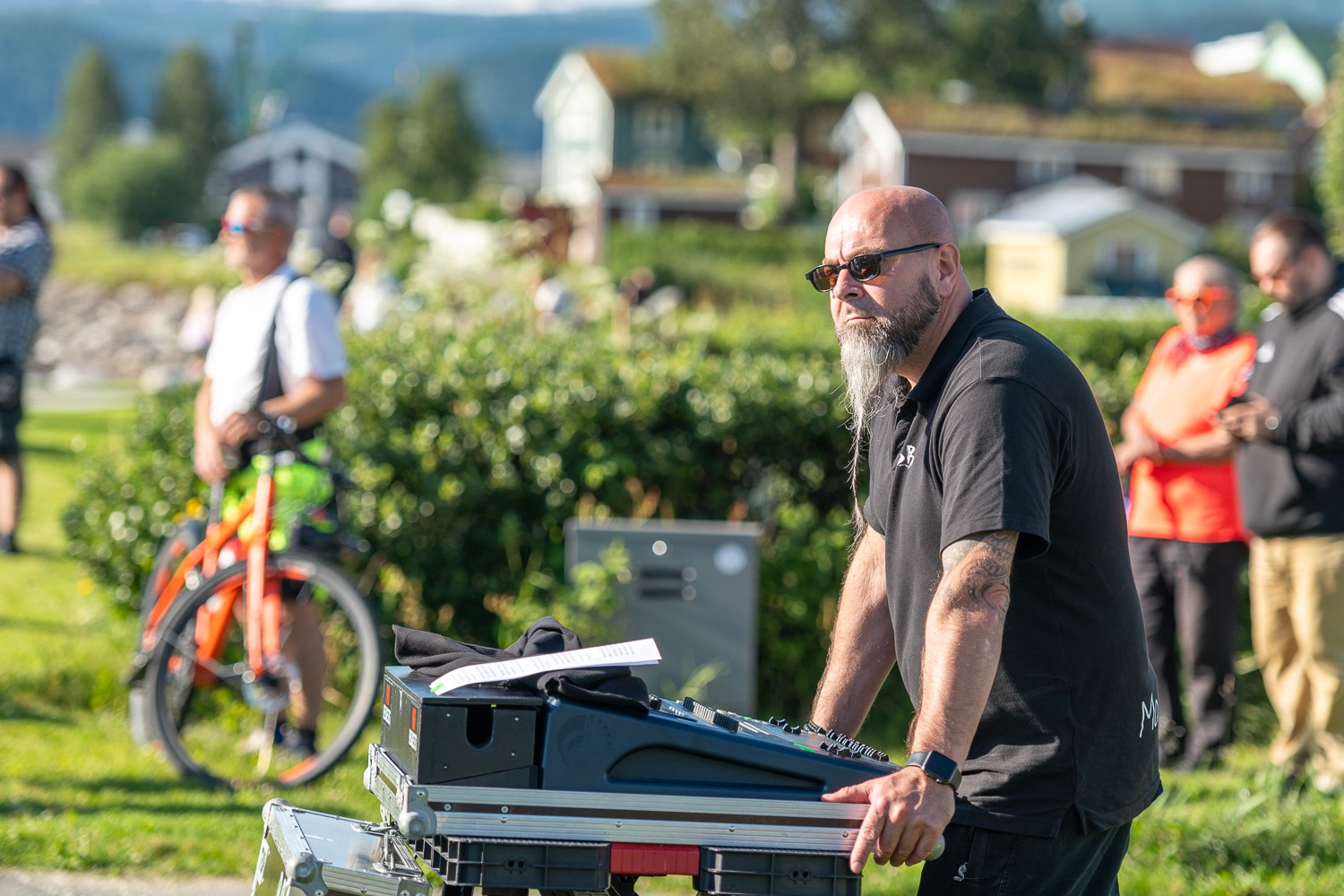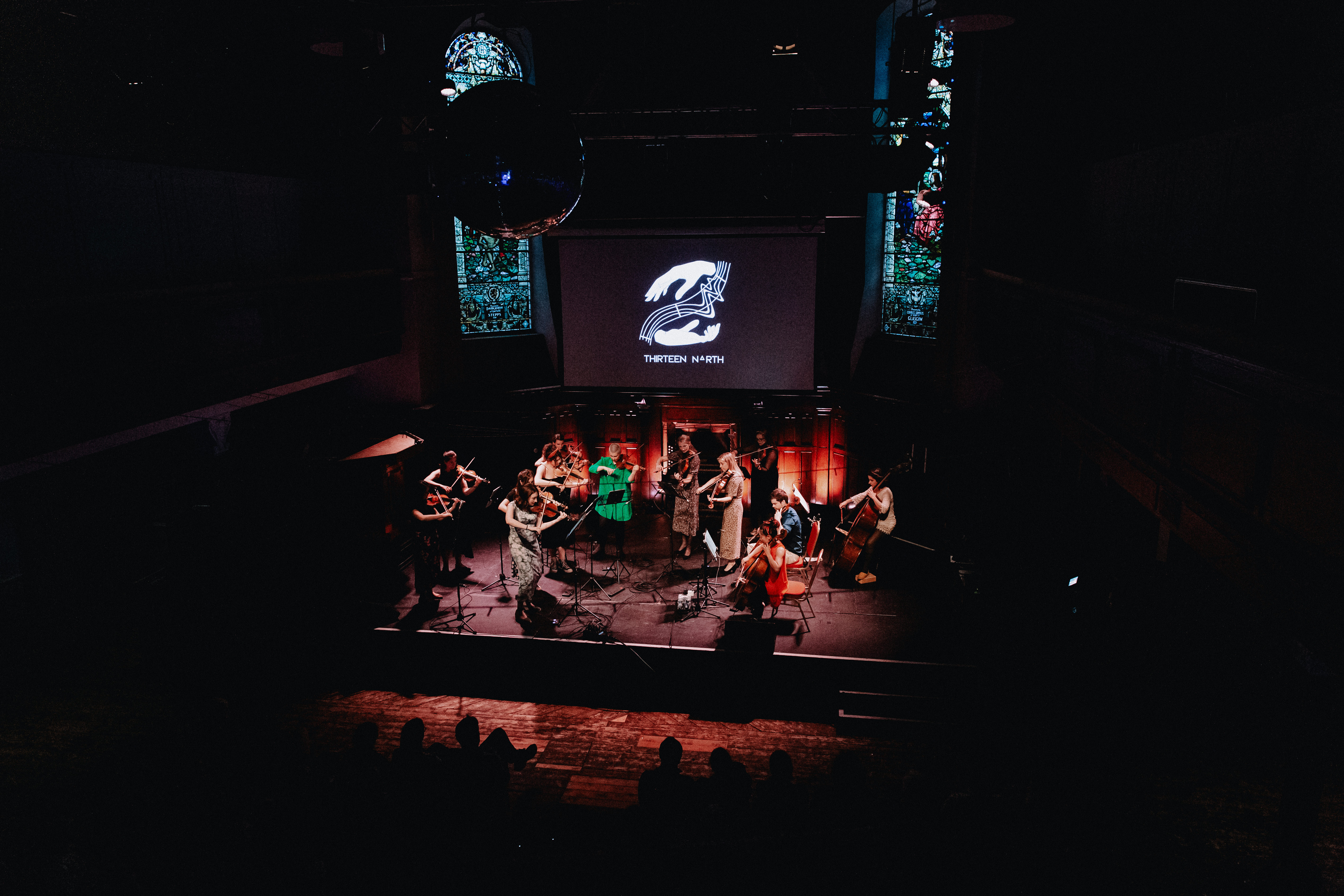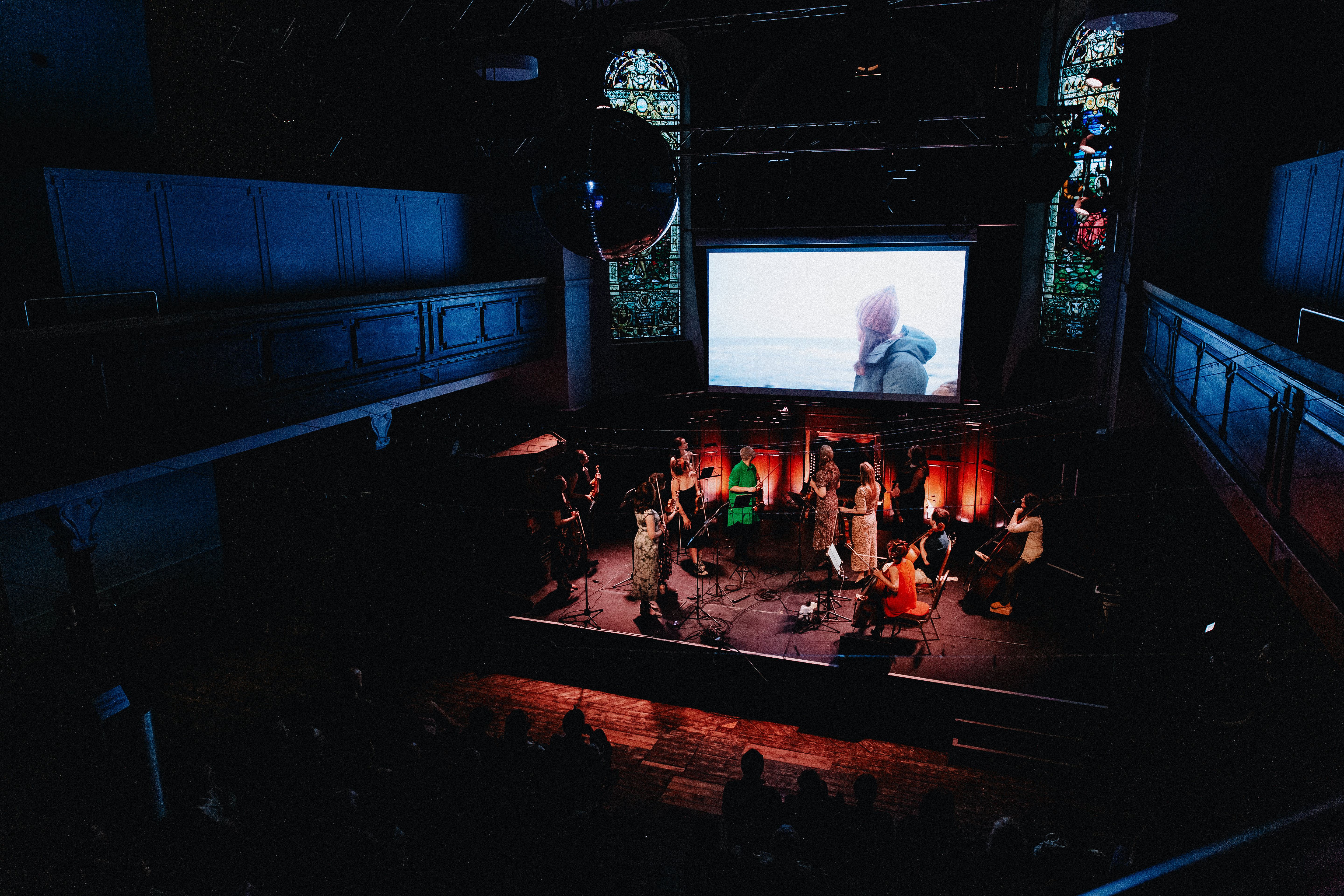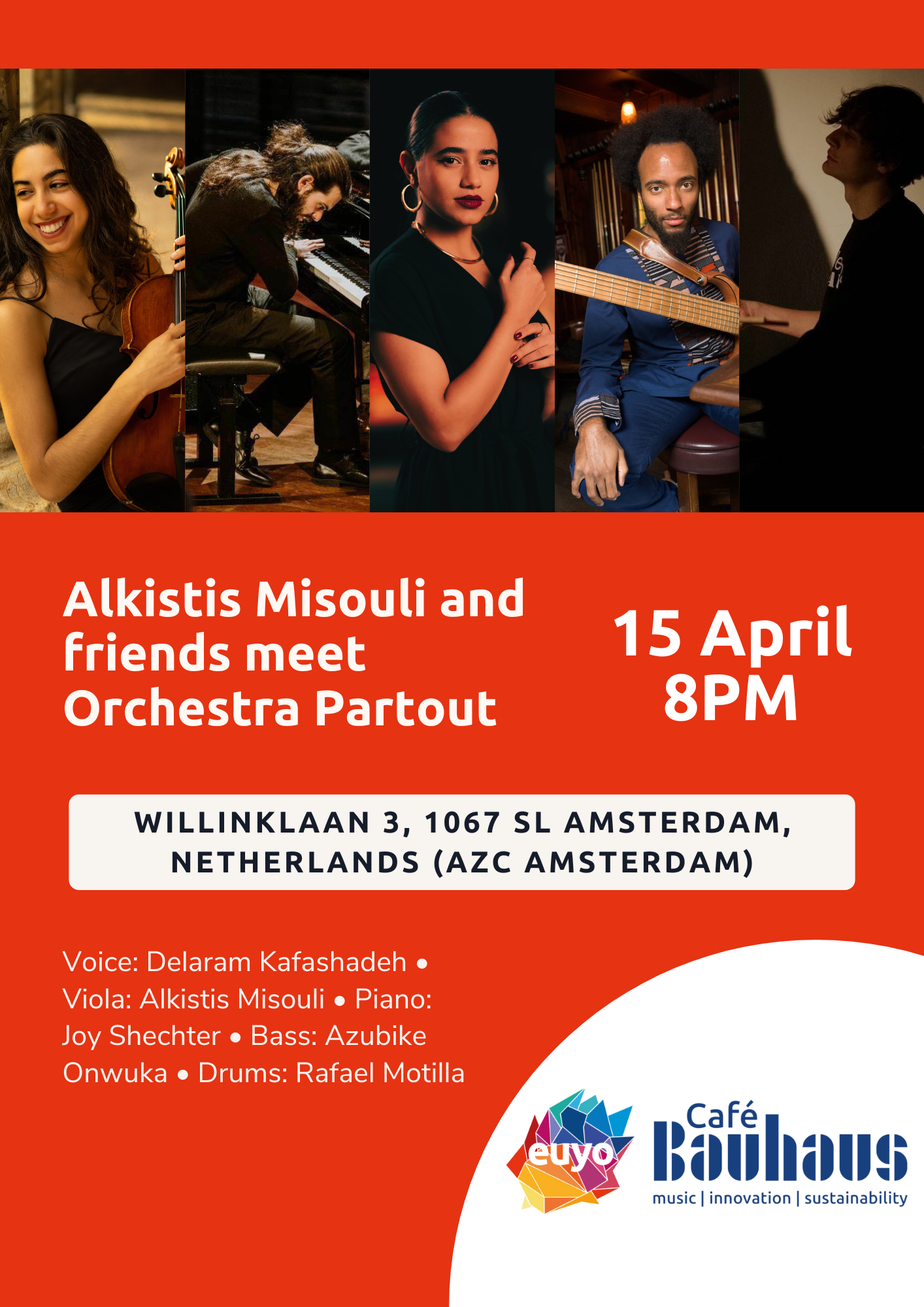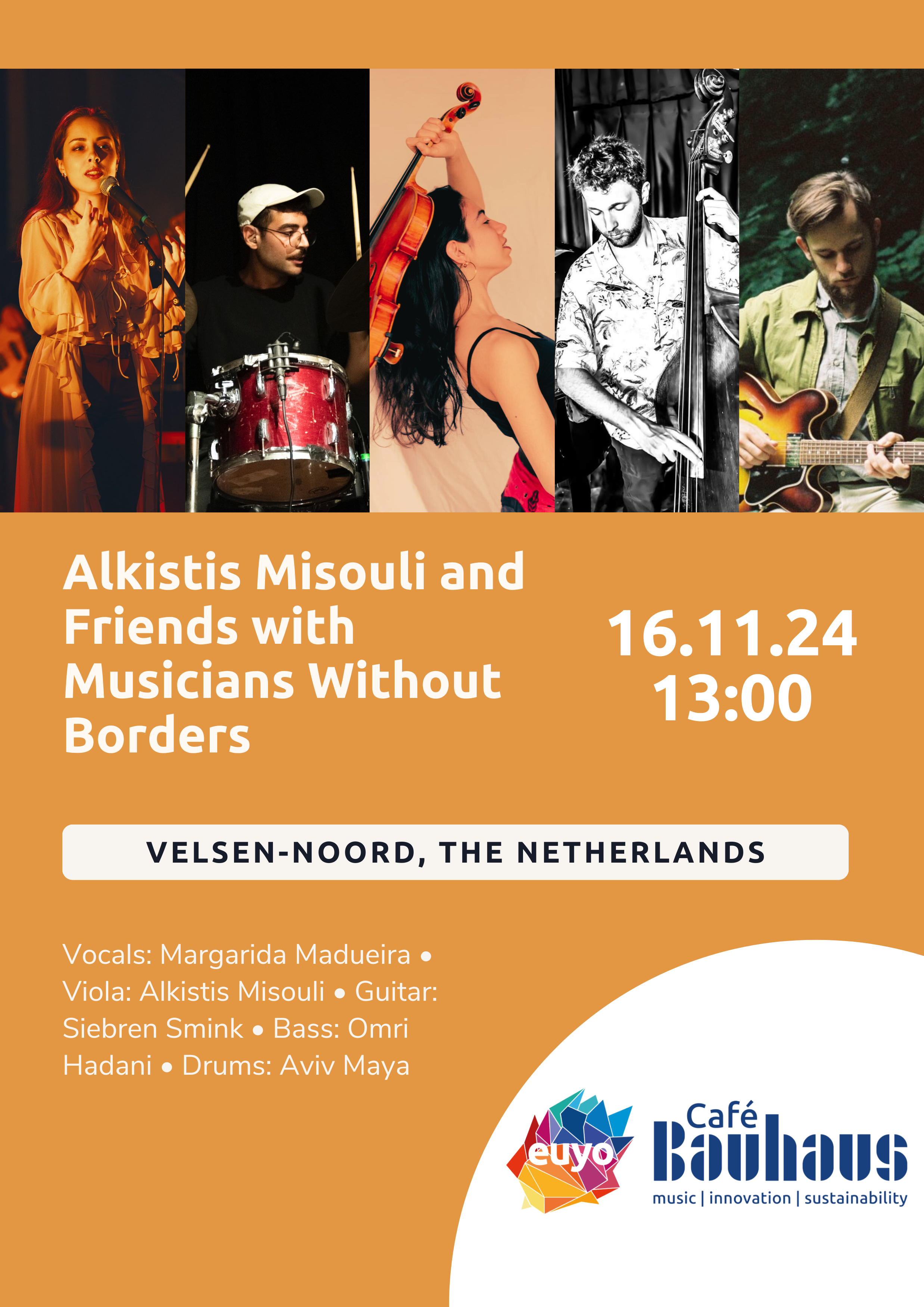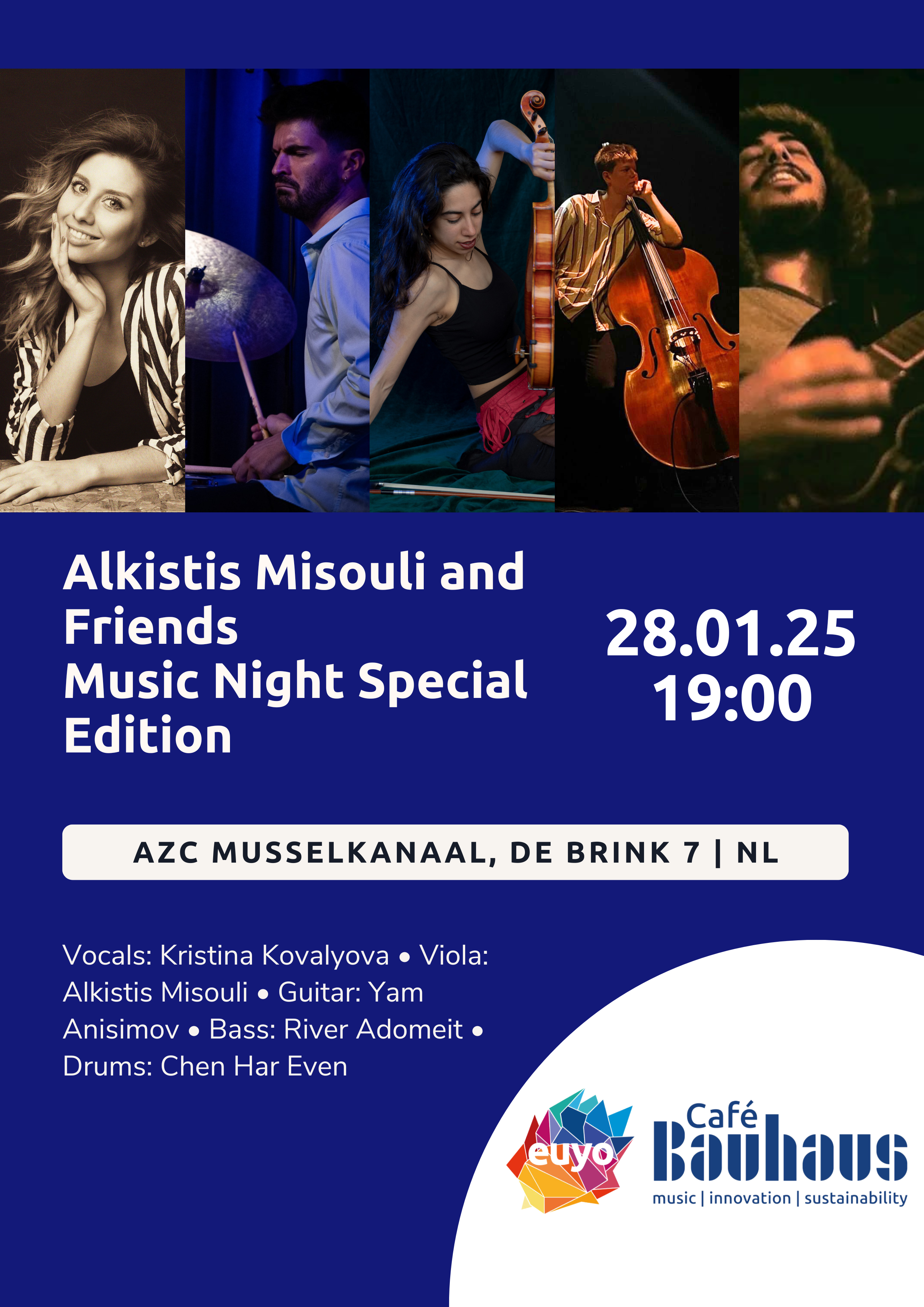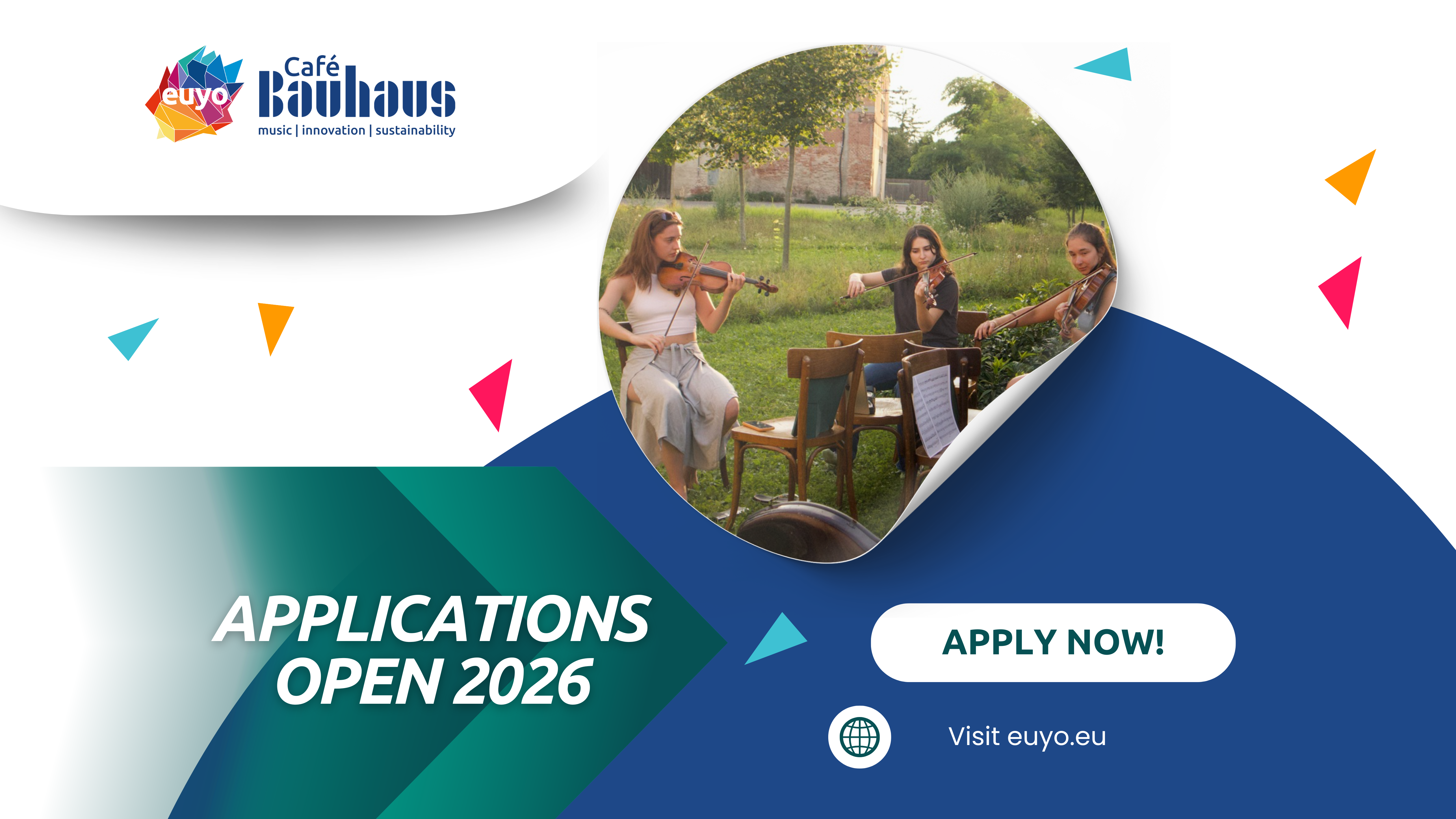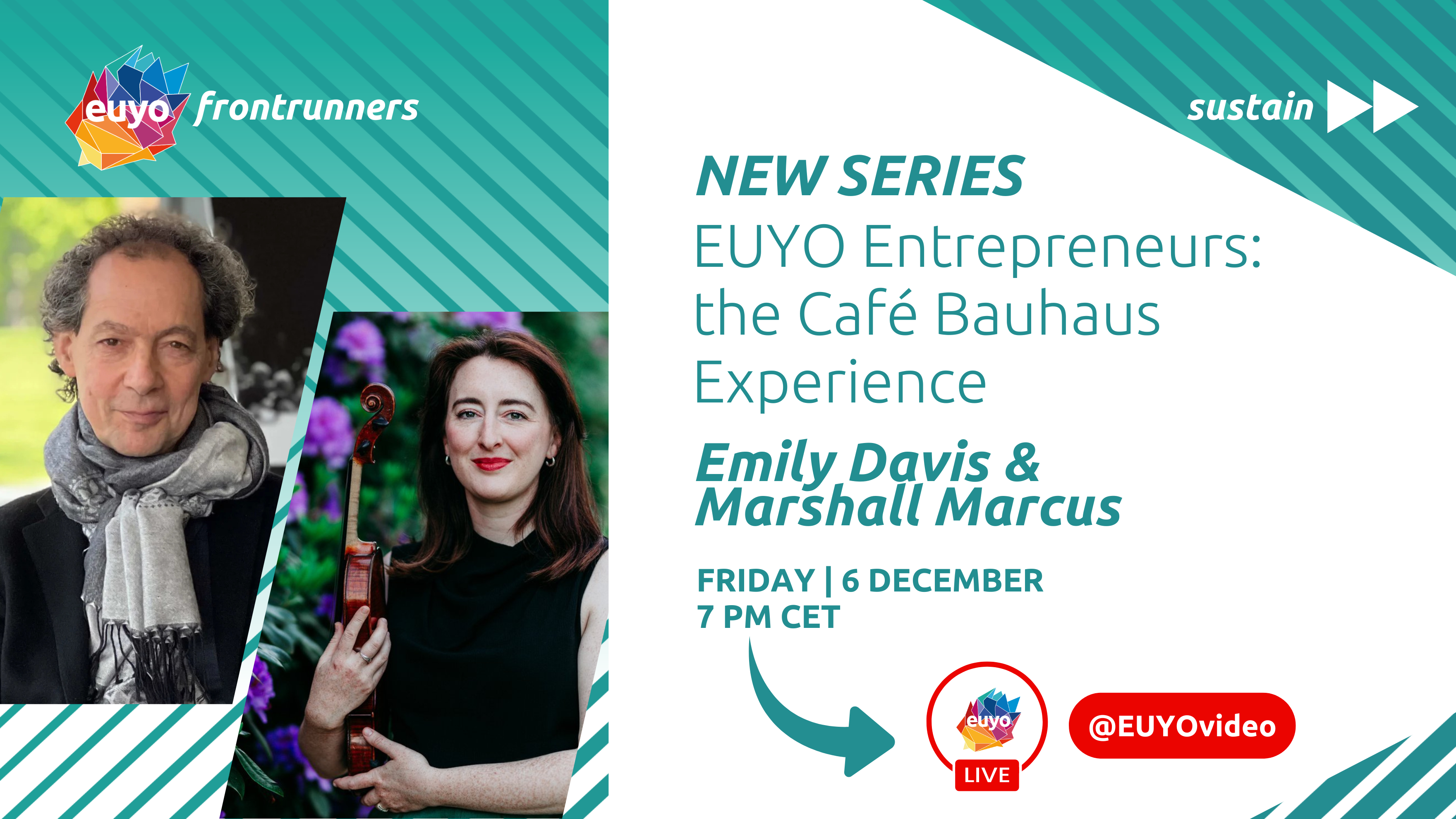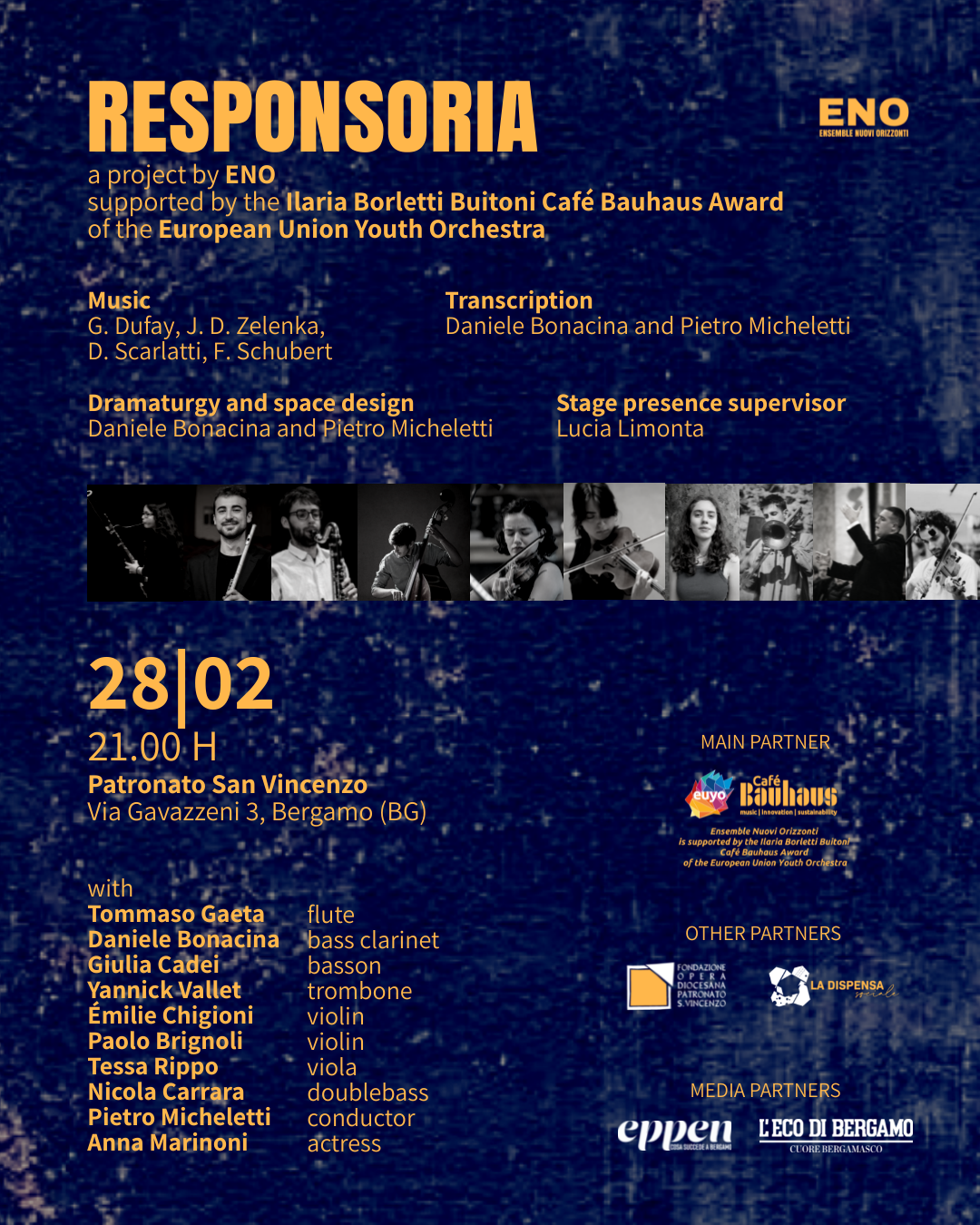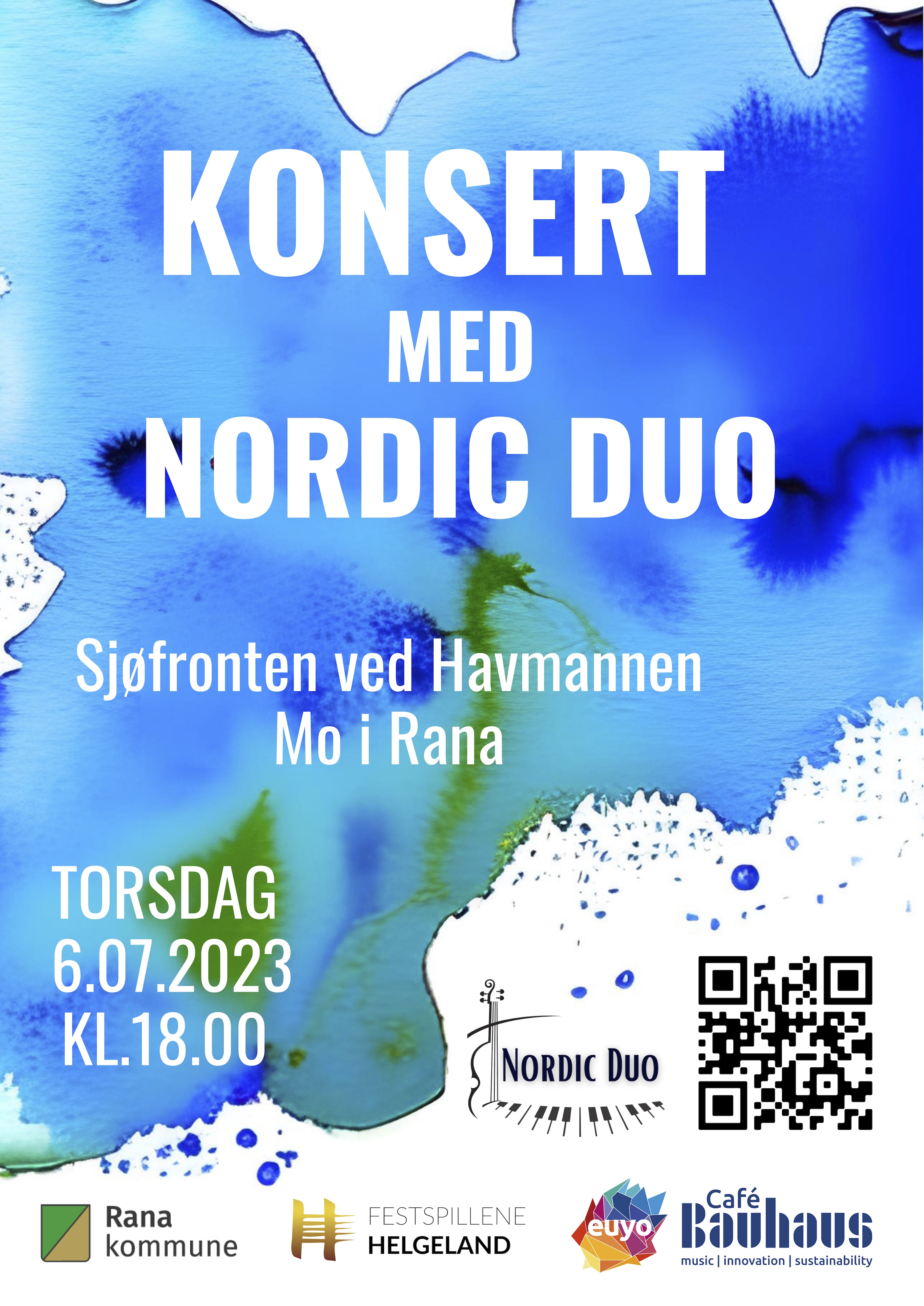Regaining a sense of belonging
EUYO Café Bauhaus
European Union Youth Orchestra Café Bauhaus Awards
Café Bauhaus supports EUYO musicians and recent alumni to create projects in their home regions, connecting great music with other forms of art and activism, in beautiful, sustainable, innovative and inclusive ways. Each award offers seed funding plus free consultancy services from the EUYO executive team and partnership network to bring the winners’ creative vision to life.
Austria
Local
Balearic Islands, Bergamo (Feb 2025), Paris, Glasgow, Mo i Rana, Prague, Vienna, the Netherlands, Lerma, Madrid, London, Silesia (2025), and Stuttgart
Mainly urban
It refers to other types of transformations (soft investment)
Yes
2024-12-31
Yes
Creative Europe
No
No
As a representative of an organisation
With only 3% of applicants securing a place each year, EUYO musicians are among the top emerging professional musicians across all 27 EU Member States. The Orchestra tours extensively every spring and summer, alongside year-round pan-European and international projects. Recognising also that music must be accessible locally, the EUYO began its Café Bauhaus Awards in 2021 with the goal of supporting its exceptional young artists to conceive and deliver beautiful, sustainable, and inclusive projects in their own communities.
Café Bauhaus projects are particularly targeted at local, young, and diverse audiences, and those new to classical music. Each award encourages connections between top-level music, other art forms, and activism, addressing societal issues like sustainability, gender equality, and inclusion. To realize these visions, we focus on two key objectives: building musicians’ own capacity as creative entrepreneurs and accompanying best-possible project execution. Excellence is crucial - in artistic vision and in implementation - because it is excellence that draws people in and makes them hungry for more.
Each Café Bauhaus award offers €5000 of seed funding plus consultancy services from the EUYO executive team and partnership network, across the fields of artistic planning, production, financial management, marketing, and communications. Awardees are also encouraged to develop further local partnerships to amplify impact.
To date, nine Café Bauhaus laureates have completed projects across the Balearic Islands, Paris, Glasgow, Mo i Rana, Prague, Vienna, the Netherlands, Lerma, Madrid, London, and Stuttgart. In 2025, new projects include an immersive contemporary music experience for Silesian schoolchildren as part of the Polish EU Presidency’s cultural programme and a reimagining of classical music incorporating street theatre and audience participation in Bergamo and Milan. The winners of the 2026 Call for Projects will be announced in March 2025.
Café Bauhaus projects are particularly targeted at local, young, and diverse audiences, and those new to classical music. Each award encourages connections between top-level music, other art forms, and activism, addressing societal issues like sustainability, gender equality, and inclusion. To realize these visions, we focus on two key objectives: building musicians’ own capacity as creative entrepreneurs and accompanying best-possible project execution. Excellence is crucial - in artistic vision and in implementation - because it is excellence that draws people in and makes them hungry for more.
Each Café Bauhaus award offers €5000 of seed funding plus consultancy services from the EUYO executive team and partnership network, across the fields of artistic planning, production, financial management, marketing, and communications. Awardees are also encouraged to develop further local partnerships to amplify impact.
To date, nine Café Bauhaus laureates have completed projects across the Balearic Islands, Paris, Glasgow, Mo i Rana, Prague, Vienna, the Netherlands, Lerma, Madrid, London, and Stuttgart. In 2025, new projects include an immersive contemporary music experience for Silesian schoolchildren as part of the Polish EU Presidency’s cultural programme and a reimagining of classical music incorporating street theatre and audience participation in Bergamo and Milan. The winners of the 2026 Call for Projects will be announced in March 2025.
Community
Access
Entrepreneurship
Innovation
Sustainability
Café Bauhaus is eponymously and directly inspired by the New European Bauhaus’s core values of sustainability, aesthetics, and inclusion.
Environmentally sustainable project design is part of each Award Call’s requirements. We highlight to applicants how the New European Bauhaus’s Green Transition aligns with the original Bauhaus movement’s fusion of art and daily life - because sustainability is essential to daily life’s functioning and thriving in 2025. Applicants are required to avoid air travel and encouraged to consult the EUYO Green Team for support in further rendering the project as carbon-neutral as possible. This Green Team is responsible for the EUYO’s sustainability policy and action plan (https://euyo.eu/responsibility/environmental-sustainability), which provides a framework across artistic planning (programming on sustainability themes), production (carbon reduction and other resource consumption), and raising sustainability awareness in communications.
The core imperative to ‘think global, act local’ at all levels of Café Bauhaus conception and realisation is designed to promote sustainability throughout the initiative, and some laureates choose particularly to highlight the issue. Trio Bórea (2022)’s Interilles promoted its sustainability agenda among tourist audiences in the Balearic Islands. Trobairitz: Histoires Naturelles (2022) took inspiration from early Medieval female troubadours to combine music with societal commentary, including tributes to nature (notably in Caroline Shaw’s string quartet Plan & Elevation: The Grounds of Dumbarton Oaks). 2025’s Ensemble Nuovi Orizzonti will support their February 2025 Responsoria artistic residency with local and zero-kilometre products.
Environmentally sustainable project design is part of each Award Call’s requirements. We highlight to applicants how the New European Bauhaus’s Green Transition aligns with the original Bauhaus movement’s fusion of art and daily life - because sustainability is essential to daily life’s functioning and thriving in 2025. Applicants are required to avoid air travel and encouraged to consult the EUYO Green Team for support in further rendering the project as carbon-neutral as possible. This Green Team is responsible for the EUYO’s sustainability policy and action plan (https://euyo.eu/responsibility/environmental-sustainability), which provides a framework across artistic planning (programming on sustainability themes), production (carbon reduction and other resource consumption), and raising sustainability awareness in communications.
The core imperative to ‘think global, act local’ at all levels of Café Bauhaus conception and realisation is designed to promote sustainability throughout the initiative, and some laureates choose particularly to highlight the issue. Trio Bórea (2022)’s Interilles promoted its sustainability agenda among tourist audiences in the Balearic Islands. Trobairitz: Histoires Naturelles (2022) took inspiration from early Medieval female troubadours to combine music with societal commentary, including tributes to nature (notably in Caroline Shaw’s string quartet Plan & Elevation: The Grounds of Dumbarton Oaks). 2025’s Ensemble Nuovi Orizzonti will support their February 2025 Responsoria artistic residency with local and zero-kilometre products.
Because Café Bauhaus’s core is music, its aesthetic contribution is at its heart.
1. Aesthetic excellence
EUYO musicians are the best of their generation. Excellence is often mistaken for elitism, but it is both aspirational and deeply accessible. Its beauty inspires and enriches communities. Exposure to great art fosters self-esteem, connection, and personal growth, expanding our understanding of ourselves and others - ultimately making us feel less alone. The artistic content, range, and conceptual quality of each Café Bauhaus project to date is detailed individally here: https://euyo.eu/projects/community/cafe-bauhaus/.
2. Something to say
Music touches people, allowing artists to address key issues on a deeper level that the cognitive alone.
Trobairitz: Histoires Naturelles (2022) drew on medieval female troubadours to tell stories of ecology and cultural diversity across Paris. Dos Miradas (‘Two Views’) (2024) explored expression and suppression through works by Shostakovich, Webern, Ravel, and Silvestrov.
Thirteen North (2022-2023) explored generations, culture, and tradition through three Scottish folk-inspired world premieres, paired with short films by Glasgow filmmaker Bircan Birol.
Alkistis Misouli and Friends (2024 & ongoing) lead workshop/jam sessions in refugee centers, inviting residents to share their music in a statement of respect and connection. "This", Alkistis recounts from her first experience of creating musical projects for refugees, "filled me with such a powerful sense of purpose that I knew I wanted to continue this work. It was much more than a concert for me. It felt absolutely necessary."
Dominik Kossakowski (2025) thematises the 2016 refugee crisis, climate change, gender, and environmental exploitation in fashion.
Responsoria (2025) uses theatre masks and the musicians serving pre-concert food to the audience (many facing marginalisation, homelessness, and poverty) to reflect on performance, authenticity, and service.
1. Aesthetic excellence
EUYO musicians are the best of their generation. Excellence is often mistaken for elitism, but it is both aspirational and deeply accessible. Its beauty inspires and enriches communities. Exposure to great art fosters self-esteem, connection, and personal growth, expanding our understanding of ourselves and others - ultimately making us feel less alone. The artistic content, range, and conceptual quality of each Café Bauhaus project to date is detailed individally here: https://euyo.eu/projects/community/cafe-bauhaus/.
2. Something to say
Music touches people, allowing artists to address key issues on a deeper level that the cognitive alone.
Trobairitz: Histoires Naturelles (2022) drew on medieval female troubadours to tell stories of ecology and cultural diversity across Paris. Dos Miradas (‘Two Views’) (2024) explored expression and suppression through works by Shostakovich, Webern, Ravel, and Silvestrov.
Thirteen North (2022-2023) explored generations, culture, and tradition through three Scottish folk-inspired world premieres, paired with short films by Glasgow filmmaker Bircan Birol.
Alkistis Misouli and Friends (2024 & ongoing) lead workshop/jam sessions in refugee centers, inviting residents to share their music in a statement of respect and connection. "This", Alkistis recounts from her first experience of creating musical projects for refugees, "filled me with such a powerful sense of purpose that I knew I wanted to continue this work. It was much more than a concert for me. It felt absolutely necessary."
Dominik Kossakowski (2025) thematises the 2016 refugee crisis, climate change, gender, and environmental exploitation in fashion.
Responsoria (2025) uses theatre masks and the musicians serving pre-concert food to the audience (many facing marginalisation, homelessness, and poverty) to reflect on performance, authenticity, and service.
Café Bauhaus has two key inclusivity objectives: including diverse audiences and embracing shared leadership with laureates. While shared and adaptive leadership is explored in the methodology section, this section highlights project approaches to audience inclusion.
Thirteen North placed inclusion at the heart of its ‘Connected’ launch concert. Praised as “genuinely warm and inclusive” by The Guardian, the group also engaged with local Additional Support Needs schools through pre-launch events.
Collab (2023) created accessible, multi-sensory performances in response to classical music’s challenges of lengthy concerts and high ticket prices. Concerts in Vienna and Prague were free of charge and lasted one hour, targeted particularly at young audiences.
The Nordic Duo (2023) performed on the Mo I Rana seafront before Antony Gormley’s Havmannen sculpture, playing music reflecting the city’s rapid development and industrial heritage.
Dos Miradas explored inclusivity through its opposite: themes of expression and suppression.
Alkistis Misouli and Friends‘s workshop/jam sessions in Dutch refugee centers offer residents an opportunity to share music from their own cultures, creating connection without a common language.
Strings & Other Things #1 (2024) combined early music and electronica in Stuttgart’s queer culture space UTOPIA Kiosk.
Responsoria’s launch concert (28.02.2025) will take place in Bergamo’s Patronato San Vincenzo, an Association supporting those facing marginalisation, homelessness, and poverty. Before their performance, the ENO musicians will serve supper in the canteen, open to both regular visitors and residents of the Association and to new audience members. "We think", says ensemble spokesperson Daniele Bonacina, "this idea supports an even closer exchange between performers and audience, and raises citizen awareness of the reality and value of the work of an organisation like Patronato san Vincenzo."
Thirteen North placed inclusion at the heart of its ‘Connected’ launch concert. Praised as “genuinely warm and inclusive” by The Guardian, the group also engaged with local Additional Support Needs schools through pre-launch events.
Collab (2023) created accessible, multi-sensory performances in response to classical music’s challenges of lengthy concerts and high ticket prices. Concerts in Vienna and Prague were free of charge and lasted one hour, targeted particularly at young audiences.
The Nordic Duo (2023) performed on the Mo I Rana seafront before Antony Gormley’s Havmannen sculpture, playing music reflecting the city’s rapid development and industrial heritage.
Dos Miradas explored inclusivity through its opposite: themes of expression and suppression.
Alkistis Misouli and Friends‘s workshop/jam sessions in Dutch refugee centers offer residents an opportunity to share music from their own cultures, creating connection without a common language.
Strings & Other Things #1 (2024) combined early music and electronica in Stuttgart’s queer culture space UTOPIA Kiosk.
Responsoria’s launch concert (28.02.2025) will take place in Bergamo’s Patronato San Vincenzo, an Association supporting those facing marginalisation, homelessness, and poverty. Before their performance, the ENO musicians will serve supper in the canteen, open to both regular visitors and residents of the Association and to new audience members. "We think", says ensemble spokesperson Daniele Bonacina, "this idea supports an even closer exchange between performers and audience, and raises citizen awareness of the reality and value of the work of an organisation like Patronato san Vincenzo."
Participatory processes have been extensive and intersect with the inclusion objectives above. Several projects assigned participation significant agency in the aesthetic success of the performances.
Collab’s Cordelia Piano Trio and painter Marius S. Binder created a live artwork on stage in response to the music. At the project’s Prague concert, audience members were given paints and canvases too. This expanded audience perception of the music in terms of colour, shape, and form, and was inviting for younger audiences and those new to classical music.
Ensemble+ (2024) centralised audience participation in their double bill at Shoreditch Treehouse, London. Audience members contributed words in their native languages, travel memories, and favourite songs to shape an improvisation. Tickets also included the right to film, providing agency to capture and share the event through one’s own lens. Both concerts in the double bill followed a similar structure, but moods and outcomes were entirely different, showcasing how audience input can transform the music.
In February 2025, Ensemble Nuovi Orizzonti will incorporate masks, street theatre, and service to explore the relationship between musicians and audiences, seeking to break down the line between active performer and passive listener. Dominik Kossakowski will be offering school-age music students immersive experiences of contemporary music, including hands-on workshops to get to grips with extended techniques and side-by-side rehearsals.
Independently of her Café Bauhaus seed funding for 2024, Alkistis Misouli continues to organise workshop/jam sessions in refugee centres. These succeed also thanks to network participation: Musicians Without Borders, the different centres (including emergency centres, whose locations cannot be divulged), and a flexible network of musician colleagues to share songs from Greek and Brazilian to Persian and Arab, connecting with the music closest to the centres’ residents.
Collab’s Cordelia Piano Trio and painter Marius S. Binder created a live artwork on stage in response to the music. At the project’s Prague concert, audience members were given paints and canvases too. This expanded audience perception of the music in terms of colour, shape, and form, and was inviting for younger audiences and those new to classical music.
Ensemble+ (2024) centralised audience participation in their double bill at Shoreditch Treehouse, London. Audience members contributed words in their native languages, travel memories, and favourite songs to shape an improvisation. Tickets also included the right to film, providing agency to capture and share the event through one’s own lens. Both concerts in the double bill followed a similar structure, but moods and outcomes were entirely different, showcasing how audience input can transform the music.
In February 2025, Ensemble Nuovi Orizzonti will incorporate masks, street theatre, and service to explore the relationship between musicians and audiences, seeking to break down the line between active performer and passive listener. Dominik Kossakowski will be offering school-age music students immersive experiences of contemporary music, including hands-on workshops to get to grips with extended techniques and side-by-side rehearsals.
Independently of her Café Bauhaus seed funding for 2024, Alkistis Misouli continues to organise workshop/jam sessions in refugee centres. These succeed also thanks to network participation: Musicians Without Borders, the different centres (including emergency centres, whose locations cannot be divulged), and a flexible network of musician colleagues to share songs from Greek and Brazilian to Persian and Arab, connecting with the music closest to the centres’ residents.
Café Bauhaus is ‘think global, act local’. Aesthetic offerings must reach people where they are, for many cannot travel even 5km for a concert or exhibition, highlighting the need for accessible local provision – which has always underpinned strong musical traditions in Europe.
Laureates must design projects for and in the regions they live and work. They collaborate with local venues, other artists and organisations. E.g. Dominik Kossakowski is working with local music pupils and well-known Silesian composers like Monika Szpyrka and Przemysław Scheller. Ensemble Nuovi Orizzonti’s upcoming artistic residency involves six community partners (a convent with a wing dedicated to hosting young and creative people, 2 anti-food waste organisations, a local library, cinema, and the Patronato san Vincenzo Association described above).
Regionally and nationally, laureates are encouraged to leverage additional supporters and networks, increasing project sustainability and impact and integrating into broader cultural frameworks. National recognition enhances the visibility of Café Bauhaus initiatives, fostering support for young artists. Thirteen North was co-supported by Creative Scotland and appeared twice at Celtic Connections and at IMBOLC (Ireland).
At European level, the EUYO provides opportunity, structure, mentorship, a partner network, and pan-EU communications. Café Bauhaus’s consultancy services have drawn on expertise across Germany, Italy, Romania, Finland, Sweden, and international partners. We send Café Bauhaus press releases to our journalist network, promote each project on our social media, and in our annual Yearbook which is sent to all EU Heads of State and Government, Ministers of Culture, key diplomatic representatives, creative and national partners, venue and other supporters. This raises awareness and support for the initiative; for the first time in 2025, we are proud that Café Bauhaus is the object of a significant philanthropic pledge.
Laureates must design projects for and in the regions they live and work. They collaborate with local venues, other artists and organisations. E.g. Dominik Kossakowski is working with local music pupils and well-known Silesian composers like Monika Szpyrka and Przemysław Scheller. Ensemble Nuovi Orizzonti’s upcoming artistic residency involves six community partners (a convent with a wing dedicated to hosting young and creative people, 2 anti-food waste organisations, a local library, cinema, and the Patronato san Vincenzo Association described above).
Regionally and nationally, laureates are encouraged to leverage additional supporters and networks, increasing project sustainability and impact and integrating into broader cultural frameworks. National recognition enhances the visibility of Café Bauhaus initiatives, fostering support for young artists. Thirteen North was co-supported by Creative Scotland and appeared twice at Celtic Connections and at IMBOLC (Ireland).
At European level, the EUYO provides opportunity, structure, mentorship, a partner network, and pan-EU communications. Café Bauhaus’s consultancy services have drawn on expertise across Germany, Italy, Romania, Finland, Sweden, and international partners. We send Café Bauhaus press releases to our journalist network, promote each project on our social media, and in our annual Yearbook which is sent to all EU Heads of State and Government, Ministers of Culture, key diplomatic representatives, creative and national partners, venue and other supporters. This raises awareness and support for the initiative; for the first time in 2025, we are proud that Café Bauhaus is the object of a significant philanthropic pledge.
The Café Bauhaus Call emphasises its transdisciplinary nature, for greater creative and entrepreneurial opportunities and to engage wider and more diverse audiences. To date, this has encompassed:
Musical styles fusing with the Western classical music core - free impro; Persian, Greek, Arabic, Brazilian, and Scottish folk; electronica; new music (premieres).
Other art forms: film, painting, video projections, video-mapping, live electronics, field recordings, sculpture, street theatre, masks, printmaking, lighting design.
Topics: refugees, climate change, gender and environmental exploitation, expression and suppression, community identity, generations, culture and tradition, audience/performer relationships, external and internal selves and outward presentations.
In amplification of the above, a specific example is Dominik Kossakowski’s upcoming (2025) project in Silesia. He will offer school-age students an immersive and hands-on experience of contemporary music because he feels this is currently lacking in the music school curricula of his region. Using his immersive methods, he will introduce new music by Monika Szpyrka, Przemysław Scheller, Bryce Dessner, and Stephen Thelen. The repertoire’s themes include the refugee crisis of 2016, the loss of Notre-Dame Cathedral’s 1000-year-old wood ceiling in 2019, an urgent call to tackle climate change, and questions of gender and environmental exploitation in the fashion industry. From this diverse yet always relevant mix, printmaking artist Modesta Gorol will craft a visual narrative: “my idea to expand the musical layer”, says Kossakowski, “giving us a broader way of expressing our thoughts on the state of modern society.” Similarly, Ensemble Nuovi Orizzonti is working with actor Lucia Limonta who will guide ENO into what is for musicians often unknown territory: the awareness of the body as a presence in a space. This will involve white, neutral theatre masks, directing focus on an inner type of theatre.
Musical styles fusing with the Western classical music core - free impro; Persian, Greek, Arabic, Brazilian, and Scottish folk; electronica; new music (premieres).
Other art forms: film, painting, video projections, video-mapping, live electronics, field recordings, sculpture, street theatre, masks, printmaking, lighting design.
Topics: refugees, climate change, gender and environmental exploitation, expression and suppression, community identity, generations, culture and tradition, audience/performer relationships, external and internal selves and outward presentations.
In amplification of the above, a specific example is Dominik Kossakowski’s upcoming (2025) project in Silesia. He will offer school-age students an immersive and hands-on experience of contemporary music because he feels this is currently lacking in the music school curricula of his region. Using his immersive methods, he will introduce new music by Monika Szpyrka, Przemysław Scheller, Bryce Dessner, and Stephen Thelen. The repertoire’s themes include the refugee crisis of 2016, the loss of Notre-Dame Cathedral’s 1000-year-old wood ceiling in 2019, an urgent call to tackle climate change, and questions of gender and environmental exploitation in the fashion industry. From this diverse yet always relevant mix, printmaking artist Modesta Gorol will craft a visual narrative: “my idea to expand the musical layer”, says Kossakowski, “giving us a broader way of expressing our thoughts on the state of modern society.” Similarly, Ensemble Nuovi Orizzonti is working with actor Lucia Limonta who will guide ENO into what is for musicians often unknown territory: the awareness of the body as a presence in a space. This will involve white, neutral theatre masks, directing focus on an inner type of theatre.
Café Bauhaus differs from mainstream classical music practices by fostering artist-driven innovation, cross-disciplinary collaboration, and direct community engagement. Unlike traditional institutions, which often prioritise pre-defined programming and hierarchical leadership, Café Bauhaus empowers young musicians to shape their own projects, integrating music with diverse art forms, social themes, and local communities.
Café Bauhaus practices shared leadership by shifting from a top-down model to a shared, collaborative approach. Each award-winner is the leader of their project, for a personal, authentic, and forward-thinking artistic vision. Among conventional orchestras and festivals, programming is usually dictated by institutions rather than artists.
While mainstream classical music often remains within its own domain, Café Bauhaus promotes boundary-crossing collaborations (as detailed in previous answers about transdisciplinary nature and commentary on topical issues). Combining music with visual arts, storytelling, technology, and audience participation creates immersive, multi-sensory experiences. Furthermore, engagement with societal issues ensures that Café Bauhaus music remains keenly relevant to the current world of its audiences.
Unlike major concert halls that primarily serve urban, ticketed audiences, Café Bauhaus takes art directly to communities, from refugee centers to schools. This local focus under the banner of the European Union Youth Orchestra, cultural ambassadors to the EU since 1976, simultaneously retains a pan-European identity, “united in diversity”.
By challenging conventional norms, Café Bauhaus reshapes classical music as a dynamic, inclusive, and socially conscious art form, making it more accessible and impactful for diverse audiences.
Café Bauhaus practices shared leadership by shifting from a top-down model to a shared, collaborative approach. Each award-winner is the leader of their project, for a personal, authentic, and forward-thinking artistic vision. Among conventional orchestras and festivals, programming is usually dictated by institutions rather than artists.
While mainstream classical music often remains within its own domain, Café Bauhaus promotes boundary-crossing collaborations (as detailed in previous answers about transdisciplinary nature and commentary on topical issues). Combining music with visual arts, storytelling, technology, and audience participation creates immersive, multi-sensory experiences. Furthermore, engagement with societal issues ensures that Café Bauhaus music remains keenly relevant to the current world of its audiences.
Unlike major concert halls that primarily serve urban, ticketed audiences, Café Bauhaus takes art directly to communities, from refugee centers to schools. This local focus under the banner of the European Union Youth Orchestra, cultural ambassadors to the EU since 1976, simultaneously retains a pan-European identity, “united in diversity”.
By challenging conventional norms, Café Bauhaus reshapes classical music as a dynamic, inclusive, and socially conscious art form, making it more accessible and impactful for diverse audiences.
Café Bauhaus builds on the EUYO’s almost 50-year training, residency, touring, and performance methodology which has become a benchmark for many other youth music ensembles (evidenced by the success of our annual Model Sharing Symposium, which welcomes around 100 attendees a year from across the EU Member States and Creative Europe participating countries). All our methodological building blocks, detailed below, underpin Café Bauhaus.
Our methodology has always focused on emerging creative professionals’ formal skill level as musicians, and their development as young people, notably through sequential Recruiting, Training, Performing, Evaluating, and Reviewing. This is embedded in Café Bauhaus through a series of planning, consultancy, and reporting sessions between applicants and the EUYO executive team.
A further core component is our Adaptive Leadership, encouraging leadership, cooperation, trust, and openness from musicians, staff, and stakeholders at all levels of the organisation. This co-creative spirit underpins all Café Bauhaus project execution, with the emphasis on maximum benefit for laureates and audiences.
Since 2020, the Orchestra has expanded its methodolgy to enmesh work on upskilling, entrepreneurship, sustainability, and social inclusion, drawing on an overall framework from the UN’s Sustainable Development Goals and needs analysis of the EU’s developing agendas. We combine this with a vigorous EU ambassadorial role, in sum to promote the sustainable, human-centric vision enshrined in Articles 2&3 of the Treaty on European Union at its highest level of excellence and therefore competitiveness.
Our development of a substantial, year-on-year community artistic initiative directly and eponymously inspired by the New European Bauhaus and in close alignment with its three core values and three working principles further aims to support the EU’s culture field policy framework as concretely as possible.
Our methodology has always focused on emerging creative professionals’ formal skill level as musicians, and their development as young people, notably through sequential Recruiting, Training, Performing, Evaluating, and Reviewing. This is embedded in Café Bauhaus through a series of planning, consultancy, and reporting sessions between applicants and the EUYO executive team.
A further core component is our Adaptive Leadership, encouraging leadership, cooperation, trust, and openness from musicians, staff, and stakeholders at all levels of the organisation. This co-creative spirit underpins all Café Bauhaus project execution, with the emphasis on maximum benefit for laureates and audiences.
Since 2020, the Orchestra has expanded its methodolgy to enmesh work on upskilling, entrepreneurship, sustainability, and social inclusion, drawing on an overall framework from the UN’s Sustainable Development Goals and needs analysis of the EU’s developing agendas. We combine this with a vigorous EU ambassadorial role, in sum to promote the sustainable, human-centric vision enshrined in Articles 2&3 of the Treaty on European Union at its highest level of excellence and therefore competitiveness.
Our development of a substantial, year-on-year community artistic initiative directly and eponymously inspired by the New European Bauhaus and in close alignment with its three core values and three working principles further aims to support the EU’s culture field policy framework as concretely as possible.
Café Bauhaus offers a flexible, scalable, and artist-driven approach that can be adapted across different cultural, social, and geographical contexts. Its core principles - shared leadership, interdisciplinary collaboration, community engagement, and grassroots action - are universally applicable, making them highly transferable to institutions, festivals, and independent artistic initiatives.
Café Bauhaus is lightweight and adaptable, allowing projects to be tailored to local needs, venues, and communities. Whether in urban or rural settings, large concert halls or informal spaces, its structure encourages participation without the constraints of traditional programming. This flexibility makes it easy to replicate across regions and artistic disciplines.
Café Bauhaus shifts artistic leadership from institutions to emerging artists, empowering them to create and implement projects independently. This self-sustaining model enables young musicians and cultural leaders to apply the approach in their own networks, fostering a ripple effect of innovation beyond the EUYO.
Café Bauhaus embraces universal artistic and social themes, expanding its potential relevance to a potentially worldwide context. The model can be integrated into orchestras, conservatoires, arts organisations, community projects, and initiatives coming from other disciplines.
The success of Café Bauhaus projects to date across diverse settings already demonstrates high transferability and replicability. While its projects 2022-2024 are completed, it is also an ongoing initiative with the 2025 winners now in the implementation phase and 2026’s about to be announced. With minimal infrastructure, it fosters inclusion, artistic experimentation, and audience engagement, offering a sustainable blueprint for future development.
Café Bauhaus is lightweight and adaptable, allowing projects to be tailored to local needs, venues, and communities. Whether in urban or rural settings, large concert halls or informal spaces, its structure encourages participation without the constraints of traditional programming. This flexibility makes it easy to replicate across regions and artistic disciplines.
Café Bauhaus shifts artistic leadership from institutions to emerging artists, empowering them to create and implement projects independently. This self-sustaining model enables young musicians and cultural leaders to apply the approach in their own networks, fostering a ripple effect of innovation beyond the EUYO.
Café Bauhaus embraces universal artistic and social themes, expanding its potential relevance to a potentially worldwide context. The model can be integrated into orchestras, conservatoires, arts organisations, community projects, and initiatives coming from other disciplines.
The success of Café Bauhaus projects to date across diverse settings already demonstrates high transferability and replicability. While its projects 2022-2024 are completed, it is also an ongoing initiative with the 2025 winners now in the implementation phase and 2026’s about to be announced. With minimal infrastructure, it fosters inclusion, artistic experimentation, and audience engagement, offering a sustainable blueprint for future development.
Café Bauhaus uses culture – particularly, music - as a catalyst for social reflection, human connection, and inclusion. These core principles all serve a sense of belonging. Deep connection with social groups, physical places, and individual and collective experiences is a fundamental human need. Yet globalisation, social fragmentation, digital isolation, political polarisation, and displacement caused by conflict all make this sense of belonging increasingly challenging. It is more important than ever to contribute to the building of communities which include and value their members.
As described in our ‘think global, act local’ approach, this contribution must happen at local level, or it cannot take effect. Classical music is often accused of being elitist and inaccessible, but this stems from the presentation, not the art form.
Music is a meaning-maker—a lesson from history, a voice in the present, a harbinger of the future. It is topical, critical, and reflective. Music empowers, teaching all who practise it that perseverance leads to achievement. It embodies unity in diversity, with different instruments creating harmony. As argued earlier, excellence and access belong together: world-class artists emerge from early music education, and true excellence allows everyone to experience music’s transformative power.
Therefore:
- Café Bauhaus removes barriers of cost, location, and exclusivity
- Café Bauhaus projects celebrate shared heritage rooted in diversity, strengthening community bonds and intercultural dialogue
- Café Bauhaus’s inclusive and participatory formats promote self-expression, emotional connection, and wellbeing
- Café Bauhaus’s integration of societal themes inspires reflection from both artists and audiences
- Café Bauhaus equips the music leaders of the future with an entrepreneurial outlook, leadership experience, and project management competencies, fostering sustainable artistic careers and a more dynamic cultural sector.
As described in our ‘think global, act local’ approach, this contribution must happen at local level, or it cannot take effect. Classical music is often accused of being elitist and inaccessible, but this stems from the presentation, not the art form.
Music is a meaning-maker—a lesson from history, a voice in the present, a harbinger of the future. It is topical, critical, and reflective. Music empowers, teaching all who practise it that perseverance leads to achievement. It embodies unity in diversity, with different instruments creating harmony. As argued earlier, excellence and access belong together: world-class artists emerge from early music education, and true excellence allows everyone to experience music’s transformative power.
Therefore:
- Café Bauhaus removes barriers of cost, location, and exclusivity
- Café Bauhaus projects celebrate shared heritage rooted in diversity, strengthening community bonds and intercultural dialogue
- Café Bauhaus’s inclusive and participatory formats promote self-expression, emotional connection, and wellbeing
- Café Bauhaus’s integration of societal themes inspires reflection from both artists and audiences
- Café Bauhaus equips the music leaders of the future with an entrepreneurial outlook, leadership experience, and project management competencies, fostering sustainable artistic careers and a more dynamic cultural sector.
As summarised at the beginning of this application, 9 Café Bauhaus projects have been realised, 2 more will happen in 2025, and 2 more in 2026. The projects reach, most probably, as many different countries and have already reached the following audience groups: tourists, urban communities (especially those new to classical music), children, children with additional support needs, refugees, and the LGBTQ community. Café Bauhaus has sparked 4 world premieres, 3 contemporary reimaginings of the classical music canon, and incorporated the large range of other disciplines documented above (transdisciplinary nature). It has upskilled its laureates in project management, financial planning, funding applications, audience-driven artistic planning, marketing, creative thinking and innovative implementation.
It is the New European Bauhaus which inspired this framework. We are proud of the impact we have achieved so far, each project coming to fruition on 5000€ of Award seed funding together with combining our laureates, our management, and our networks for the best possible results. It is our ambition to expand this impact both by raising the funds available for it and continuing to support each and every laureate to the best of our collective ability.
It is the New European Bauhaus which inspired this framework. We are proud of the impact we have achieved so far, each project coming to fruition on 5000€ of Award seed funding together with combining our laureates, our management, and our networks for the best possible results. It is our ambition to expand this impact both by raising the funds available for it and continuing to support each and every laureate to the best of our collective ability.

